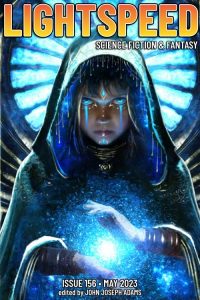Charles Payseur Reviews Short Fiction: Flash Fiction Online, Lightspeed, and F&SF
 Flash Fiction Online 4/23
Flash Fiction Online 4/23
Lightspeed 5/23
F&SF 5-6/23
The April Flash Fiction Online opens with Sheila Massie’s interesting take on the fae and dance clubs in “Fae Magic on a Friday Night”. Like Biswas’s story, the standard tropes surrounding the supernatural are subverted and turned around. The fae in this story aren’t the ones preying on humans, but rather have become sources of an almost narcotic magic that they can’t help but exude, and that humans have found chilling ways of exploiting. Unlike with Biswas’s piece, though, this story’s narrator isn’t conflicted about the arrangement, and readers are left with the unsettling and chilling casualness with which the narrator moves through the club, taking magic ruthlessly and with the aim to abuse it. Massie does a fine job interrogating party culture, consent, and violation in ways that I haven’t seen before, which is especially impressive given the shorter word counts of flash fiction.
Moving into May finds Sharang Biswas with another notable story, this time in Lightspeed with “When Shiva Shattered the Time-Stream”. It’s a story heavy with grief as a man’s marriage has ended and in his heartbreak, he’s inadvertently broken time as well, going back again and again to try and fix his marriage and avoid the pain of its dissolution. The story plays with the tantalizing notion that there can be a “right” path that avoids pain and loss – where Shiva and his husband stay together and in love forever. Biswas tugs on the heartstrings through Shiva’s desperation and desire, but settles on a more complicated and arguably more mature understanding of time, love, and happy endings. It’s a fantastic read. Wole Talabi also returns to the publication with a new Weekdays story, “Saturday’s Song”, in which the days of the week are personified as god-like beings whose domain is stories. Following Wednesday’s punishment for trying to change one of the stories in the Weekdays’ care, her sister Saturday has a plan to remind all her siblings that there are different ways to change a story and its impact. Like telling it out of order, which is how she shifts the context and power of a story to remind them all that they are still family, and that by leaning too hard into retribution and anger they risk locking themselves into conflict and tragedy. It’s a welcome addition to the worldbuilding and character work Talabi began in “Wednesday’s Story”, standing well on its own but definitely enriched for readers who get to experience both.
The May/June issue of F&SF is once again full of a great mix of fiction and poetry, and a whole lot of authors making their F&SF debut, including Kiran Kaur Saini with “Amrit”, a story about an old man, Fox, and the robot assistant sent to help him, Amrit. Fox is, to put it politely, a curmudgeon, unwilling at first to engage at all with Amrit, but their genuine effort and care begins to win him over all the same. That is, until Fox is pushed to confront aspects of himself and his life that he’s desperate not to. Saini lingers on connection, conversation, a consent throughout, showing through Fox’s stumbles and struggles how difficult it can be to accept help when you’ve internalized toxic beliefs, but also how necessary and powerful it can be, too. Ferdison Cayetano also debuts in F&SF with “A Conjure-Horse in San Ouvido”, which finds a Black soldier, Preacher, fighting for the United States government in the Philippines in a historical fantasy full of haints and hags and more. Preacher’s knowledge of what other (white) soldiers consider superstition helps to protect him from the spectral dangers of the area, but not from the racist violence of his fellow soldiers, and on the other side of the conflict, the “rebels” use what skills they can to fight for their freedom, but see in Preacher and other Black soldiers possible allies against American imperial injustice. Cayetano does careful and wonderful work in capturing the fraught and precarious positions of the characters, and showing how even in the depths of a terrible war there can be joy and triumph and new possibilities. Fatima Taqvi shifts into a story shaped like a folktale in “A Truth So Loyal and Vicious”, in which two sisters are fated at birth so that one, Sukh, will be fortunate, and the other, Dukh, will be unfortunate. After the babes are mixed up, though, and their mother simply decides which must be Sukh and Dukh, their lives seem to be defined not based on what their fate will be, but based on what their fate is perceived to be. Sukh grows up insulated and valued while Dukh is willing to fight for what she believes in. The difference in treatment doesn’t lead to resentment from Dukh, though, who still loves her sister and still risks everything to try and secure Sukh’s comfort and desires. Taqvi weaves a complex and messy tapestry of fate, family, and failure, looking at home perceptions can shape the world, but also how kindness, justice, and care can be just as powerful as prophecy.
Moving to the issue’s poetry, Gretchen Tessmer delivers a piece pulled from fairy tales in “Silverlocks”, in which a princess who was feared for her connections to the wild and magical is trying to escape the captivity she was forced into. Injured, scared – she risks everything for a chance at freedom and finds, finally out from the walls of her prison, the world that has always been denied to her, and the power that her jailers feared most. Tessmer manages a strong narrative through verse, with worldbuilding and characters that make me wish there were more installments to follow. And I’ll end on Shaoni White’s “The Wren in the Hold”, which finds a wren brought back from extinction inside a ship flying through space. White deals with themes of loss and devastation, and the accomplishment of bringing back an animal that has been completely wiped out contrasted against the confinement and isolation that the wren feels waking up inside a metal cage. The piece is full of silences that might be pauses, the wren waiting for a reply that never comes, or might be the wren finding their voice after being absent and silent for so long. It’s a vivid and fascinating piece that’s well worth spending some time with!
Recommended Stories:
“When Shiva Shattered the Time-Stream”, Sharang Biswas (Lightspeed 5/23)
“A Conjure-Horse in San Ouvido Ferdison Cayetano (F&SF 5-6/23)
Charles Payseur is an avid reader, writer, and reviewer of speculative fiction. His works have appeared in The Best American Science Fiction and Fantasy, Lightspeed Magazine, and Beneath Ceaseless Skies, among others, and many are included in his debut collection, The Burning Day and Other Strange Stories (Lethe Press 2021). He is the series editor of We’re Here: The Best Queer Speculative Fiction (Neon Hemlock Press) and a multiple-time Hugo and Ignyte Award finalist for his work at Quick Sip Reviews. When not drunkenly discussing Goosebumps, X-Men comic books, and his cats on his Patreon (/quicksipreviews) and Twitter (@ClowderofTwo), he can probably found raising a beer with his husband, Matt, in their home in Eau Claire, Wisconsin.
This review and more like it in the June 2023 issue of Locus.
 While you are here, please take a moment to support Locus with a one-time or recurring donation. We rely on reader donations to keep the magazine and site going, and would like to keep the site paywall free, but WE NEED YOUR FINANCIAL SUPPORT to continue quality coverage of the science fiction and fantasy field.
While you are here, please take a moment to support Locus with a one-time or recurring donation. We rely on reader donations to keep the magazine and site going, and would like to keep the site paywall free, but WE NEED YOUR FINANCIAL SUPPORT to continue quality coverage of the science fiction and fantasy field.
©Locus Magazine. Copyrighted material may not be republished without permission of LSFF.





